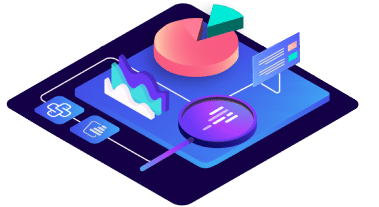
The certified online training as a Data Analyst - Focus Python enables you to independently clean, prepare and visualize data and make business-relevant predictions.
You will gain high-demand skills in the Python programming language to qualify for the job role of Data Analyst or another analytical job role such as Business Intelligence Analyst or Financial Analyst upon successful completion of the career path.
Objective: Introduction to programming with Python
Description: Participants familiarize themselves with the interactive learning environment - the StackFuel Data Lab - and the Python programming language.
Chapter 1: Python Basics
Objective: Learn the basics of programming
Description: Participants navigate through the Data Lab for the first time and get to know the basics of programming. They learn to store numbers and text as variables in Python and to store these as groups in lists. To complete these basics, participants also learn how to read error messages correctly.
Chapter 2: Programming Basics
Objective: Build fundamental programming skills
Description: Participants continue to build their fundamental programming skills. This chapter focuses on applying functions and conditional flow controls.
Chapter 3: Loops and Functions
Objective: Expand knowledge of flow control with loops
Description: The last chapter of the basics module is dedicated to flow control using loops. Participants broaden their abilities by importing additional Python packages. By the end of the chapter, participants know the most important programming concepts that are important working as a data analyst.
Objective: Independent collection, analysis and visualization of data with Python
Description: Participants learn to access, filter, and merge new data sources. They practice making company data available in attractive visualizations tailored to the target audience, and independently carry out classic data processing (importing, filtering, cleaning, and visualizing data).
Chapter 1: Data Pipelines (Pandas)
Objective: Efficient use of Pandas for data analysis
Description: This chapter teaches the efficient use of Pandas – the standard data analysis tool in Python. Participants learn to use it to read, clean, and aggregate data in CSV files.
Chapter 2: Data Exploration (Matplotlib)
Objective: Practice visualizing different types of data
Description: Participants practice visualizing different types of data using marketing data. Numeric data is represented as histograms and scatter plots, while categorical data is represented as column and pie charts.
Chapter 3: Predictions (Statistics)
Objective: Learn statistical concepts and make predictions
Description: Participants learn statistical concepts such as the median and quartiles using product ratings. They identify outliers and make simple predictions using linear and logistic regression.
Chapter 4: Internal Data (SQL)
Objective: Learn SQL for data retrieval
Description: Participants learn to read databases using a human resources database as an example and formulate standard SQL queries.
Chapter 5: External Data (API)
Objective: Access external data sources using APIs
Description: Participants use Python to access information such as web pages and APIs designed by StackFuel on the Internet.
Chapter 6: Advanced Jupyter
Objective: Learn advanced Jupyter functionalities
Description: Participants learn Jupyter functionalities and solve advanced visualization problems such as live updates and interactivity in the context of a stock market scenario.
Chapter 7: Exercise Project
Objective: Apply Python skills to a practical project
Description: Participants analyze a New York taxi data set with over one million trips and use their Python skills as independently as possible to answer certain questions.
Chapter 8: Final Project
Objective: Complete a comprehensive data analysis project
Description: Participants analyze customer churn for a telecommunications company. They work through the entire data pipeline independently and answer typical questions. They then present their project in a 1-on-1 feedback session with the StackFuel mentor team.
The demand for data experts is high. Around 4 million data experts will be needed in Europe by 2025. In Germany alone, 149,000 IT jobs are currently vacant. The demand for data and AI experts in particular continues to grow enormously.
But a decision for a data career is so much more than just a safe decision for the future! As a data expert, you deal with powerful, socially relevant topics, are a tech professional, and are communicative and creative at the same time. The profession is varied, can be combined with most other professions and offers an attractive salary. And most importantly, with us it can be learned unerringly!
Yes, after successful completion of the training, you will receive a certificate of completion from us that you can show in your job applications. Data Analysts and Data Scientists are desperately sought after in many business sectors. Even without relevant work experience, your chances of finding an entry-level job are good. In addition, there are analysts in almost every industry who have different job titles, but the skills you need are the same as those of a data analyst or data scientist.
Yes, our online training courses are designed to offer you the greatest possible flexibility. In general, we recommend that you plan six to eight hours per week for learning. When you want to schedule this time is up to you and is not prescribed by us. In our career paths, the Data Analyst and Data Scientist course, we offer live webinars where you can ask our mentors questions, but you don't have to attend if it doesn't fit into your schedule.
(Participants in our sponsored training courses are excluded. These must attend a fixed number of hours per week and are obliged to participate in the live webinars).





StackFuel GmbH
Nostitzstrasse 20
10961 Berlin
info@stackfuel.com
030 / 544 533 420
We need your consent before you can continue to visit our website. We use cookies and other technologies on our website. Some of them are essential, while others help us improve this website and your experience. For more information about how we use your data, please see our Privacy policy.
We use cookies and other technologies on our website. Some of them are essential, while others help us improve this website and your experience. For more information about how we use your data, please see our Privacy policy. Here you can find an overview of all cookies used. You can give your consent for entire categories or view more information and select specific cookies.